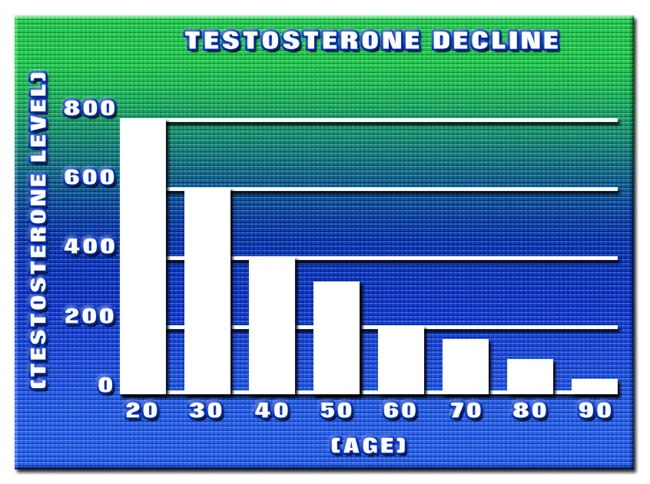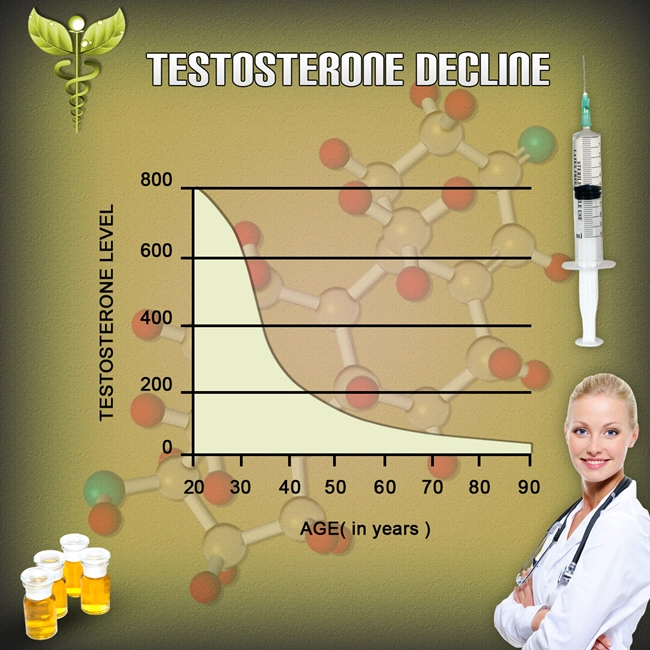
Video Link: https://vimeo.com/286619626
Video Download: Click Here To Download Video
Video Stream: Click Here To Stream Video
For decades a myth has persisted: testosterone causes prostate cancer. It has persisted in spite of the fact that this link has been repeatedly proven to be false. Before beginning testosterone replacement therapy (TRT) with our clinics we will ensure that the testosterone regimen we designed for you will be created for you as a unique individual, and your treatment will be monitored to measure progress and safety.
But we don't limit our programs to hormone replacement. We are on the cutting edge of all areas of medicine, and that includes pharmacology and any other prescriptions that may be beneficial.
Statins, best known for lower cholesterol levels, may have a surprising additional benefit. They have shown the ability to slow the progression of prostate cancer in patients receiving hormone therapy, according to a new study.
 The study consisted of 926 men undergoing hormone therapy for advanced prostate treatment.
The study consisted of 926 men undergoing hormone therapy for advanced prostate treatment.
The results were encouraging: those taking statins saw their cancer remain stable for an average of 27.5 months before deteriorating, compared with a mean of 17.4 months among men not taking statins.
"These findings are preliminary, so I would not recommend that everybody start on statins to slow prostate cancer," said senior study author Dr. Philip Kantoff, chief of solid tumor oncology at the Dana-Farber Cancer Institute in Boston.
However, the jury is still out. Kantoff cautioned that these findings apply only to men who have advanced prostate cancer that has relapsed after hormone therapy.
"This does not speak to early-stage prostate cancer or whether statins are beneficial in preventing prostate cancer," he said.
Patients in the study, conducted from 1996 to 2013, were followed for an average of six years. The report was published online on May 7th in JAMA Oncology.
Hormone therapy is the usual treatment for men who have prostate cancer that has spread beyond the prostate gland. The procedure deprives the body of testosterone, the male hormone that helps cancer cells grow. In essence, this is chemical castration.
However, there are a few problems with this approach. The side effects are horrendous: hot flashes, joint aches and pains, insomnia, a steep decline in strength, and numerous other problems.
And if that weren't bad enough, as time passes, hormone therapy becomes less effective, and cancer begins to grow again.
So how do statins achieve these results? Kantoff explained that statins keep testosterone from entering cancer cells. They block dehydroepiandrosterone  sulfate (DHEAS), a precursor of testosterone, thus preventing cancer cell growth, he said.
sulfate (DHEAS), a precursor of testosterone, thus preventing cancer cell growth, he said.
Additionally, lab experiments indicated that statins use up the available supply of a protein called SLCO2B1, which allows various drugs and hormones to enter cells.
This appears to keep DHEAS from the cancer cells, making hormone therapy more efficient.
"This is a plausible mechanism by which a statin may have a benefit to prostate cancer patients," Kantoff said.
Kantoff also added that more studies are needed to verify their conclusions. "We have a strong hypothesis, but it is by no means proof that statins prolong the time to relapse. But the data is strongly suggestive that that's the fact," he said.
Adding a statin to hormone therapy may be a way to make hormone therapy last longer and prevent cancer from progressing, Kantoff said.
Dr. Jorge Ramos, hematology, and oncology fellow at the University of Washington/Fred Hutchinson Cancer Research Center discussed the study's relevance.
"Other studies have suggested that statins might have a role in preventing cancer or reducing the risk of dying from cancer," he said.
This study suggests how statins might act in slowing the progression of cancer, said Ramos, co-author of an editorial accompanying the study. "Statins by themselves probably won't prevent cancer from growing, but in combinations with other treatments could improve outcomes for patients," he said.
However, Ramos agreed with Kantoff that clinical trials are needed before people start taking statins to prevent or slow cancer.
 Several trials are getting underway to test the benefits of statins in prostate cancer patients, Ramos said. But the results won't be available for several years, he said.
Several trials are getting underway to test the benefits of statins in prostate cancer patients, Ramos said. But the results won't be available for several years, he said.
For now, current data is insufficient to support taking statins to prevent prostate cancer or to live longer if you have it, Ramos said.
In the United States, it's estimated that one in seven men will develop prostate cancer in their lifetime. About 220,800 new cases and 27,540 deaths from prostate cancer will be recorded this year, according to the American Cancer Society.
Contact us for a FREE, no-obligation discussion of the benefits of testosterone replacement therapy.
Reference
Contact Us Today For A Free Consultation
Dear Patient,
Once you have completing the above contact form, for security purposes and confirmation, please confirm your information by calling us.
Please call now: 1-800-380-5339.
Welcoming You To Our Clinic, Professor Tom Henderson.

- Are You Constantly Feeling Tired And Fatigued ? [Last Updated On: May 21st, 2024] [Originally Added On: May 1st, 2018]
- Constantly Tired? Can't Sleep? [Last Updated On: April 10th, 2024] [Originally Added On: March 23rd, 2019]
- How to Understand and Deal with Cirrhosis [Last Updated On: April 9th, 2024] [Originally Added On: April 12th, 2019]
- Insomnia: The Silent Killer [Last Updated On: April 8th, 2024] [Originally Added On: April 30th, 2019]
- Lipocine Reintroduces Tlando [Last Updated On: July 18th, 2024] [Originally Added On: March 18th, 2020]
- High-Intensity Interval Training Boosts Both Body and Mind [Last Updated On: February 20th, 2025] [Originally Added On: May 10th, 2020]
- Tattoo Safety: What to Know Before You Get a Tattoo [Last Updated On: February 28th, 2025] [Originally Added On: June 2nd, 2020]
- Testosterone and Fatherhood [Last Updated On: May 20th, 2024] [Originally Added On: October 12th, 2020]
- L-Arginine: The Key to Both Heart Health and Sexual Health [Last Updated On: April 6th, 2024] [Originally Added On: December 4th, 2020]
- The Importance of Hormonal Balance for Menopause [Last Updated On: February 20th, 2025] [Originally Added On: December 14th, 2020]
- Menopause Drugs: Study Stokes New Debate Over Cancer Risks [Last Updated On: March 8th, 2025] [Originally Added On: December 16th, 2020]
- Study Examines Link Between Growth Hormones and Osteoporosis [Last Updated On: April 7th, 2024] [Originally Added On: December 17th, 2020]
- Everything You Need to Know About Clomiphene [Last Updated On: March 9th, 2025] [Originally Added On: December 20th, 2020]
- Fast Facts About DHEA: What You Need to Know About This Natural Steroid [Last Updated On: July 15th, 2024] [Originally Added On: March 4th, 2021]
- Enjoy a Few Drinks Weekly? Beware: This May Be a Link to Low Sperm Counts and Quality [Last Updated On: March 6th, 2025] [Originally Added On: August 16th, 2021]
- Hormone Therapy May Benefit Some Women's Hearts [Last Updated On: February 20th, 2025] [Originally Added On: August 18th, 2021]
- HGH Male Blood Panel [Last Updated On: October 28th, 2021] [Originally Added On: September 28th, 2021]
- Growth Hormone Battles Osteoporosis [Last Updated On: February 26th, 2025] [Originally Added On: October 11th, 2021]
- Growth hormone = More Sleep = Better Sex! [Last Updated On: March 7th, 2025] [Originally Added On: October 11th, 2021]
- Low Testosterone and Hypogonadism: The Difference [Last Updated On: June 10th, 2024] [Originally Added On: October 12th, 2021]
- The Link Between Testosterone and Tylenol [Last Updated On: February 21st, 2025] [Originally Added On: October 12th, 2021]
- Hormone Replacement Therapy and Aerobics May Ease Menopause Symptoms [Last Updated On: February 19th, 2025] [Originally Added On: October 13th, 2021]
- Growth Hormone and Lifestyle = An Extended Lifespan [Last Updated On: February 23rd, 2025] [Originally Added On: October 13th, 2021]
- Growth Hormone, Foods, and Supplements for Healthy Skin [Last Updated On: June 1st, 2024] [Originally Added On: October 13th, 2021]
- Hormone Replacement Therapy, Menopause, and Cancer [Last Updated On: February 24th, 2025] [Originally Added On: October 13th, 2021]
- Growth Hormone, Exercise, and Osteoporosis: The Facts! [Last Updated On: February 22nd, 2025] [Originally Added On: October 13th, 2021]
- Hormone Replacement Therapy and Menopause [Last Updated On: February 25th, 2025] [Originally Added On: October 13th, 2021]
- Testosterone and Women [Last Updated On: February 18th, 2025] [Originally Added On: October 13th, 2021]
- Growth Hormone and Smoking [Last Updated On: February 19th, 2025] [Originally Added On: October 14th, 2021]
- Researchers Investigate Declining Sperm Counts, Find Chemicals Rampant [Last Updated On: June 14th, 2024] [Originally Added On: June 14th, 2022]
- Understanding the Role of Hormonal Balance in Menopause [Last Updated On: February 7th, 2025] [Originally Added On: February 7th, 2025]
- Introduction: Benefits of Hormone Replacement Therapy [Last Updated On: February 8th, 2025] [Originally Added On: February 8th, 2025]
- The Influences and Benefits of High-Intensity Interval Training [Last Updated On: February 8th, 2025] [Originally Added On: February 8th, 2025]
- The Link Between Human Growth Hormone, Exercise, and Osteoporosis [Last Updated On: February 9th, 2025] [Originally Added On: February 9th, 2025]
- The Therapeutic Benefits of Human Growth Hormone [Last Updated On: February 16th, 2025] [Originally Added On: February 16th, 2025]
- Introduction: The Reality of Menopause [Last Updated On: February 18th, 2025] [Originally Added On: February 18th, 2025]
- An Introduction to the Benefits of Human Growth Hormone Replacement Therapy [Last Updated On: February 19th, 2025] [Originally Added On: February 19th, 2025]
- Introduction to Hormone Replacement Therapy [Last Updated On: February 20th, 2025] [Originally Added On: February 20th, 2025]
- Introduction: Evaluating the Safety of Hormone Replacement Therapy [Last Updated On: February 23rd, 2025] [Originally Added On: February 23rd, 2025]
- The Rise of Tattoos in America [Last Updated On: February 23rd, 2025] [Originally Added On: February 23rd, 2025]
- The Influence of Growth Hormone and Sleep on Libido [Last Updated On: February 27th, 2025] [Originally Added On: February 27th, 2025]
- Introduction: The Association Between Alcohol Consumption and Sperm Quality [Last Updated On: February 27th, 2025] [Originally Added On: February 27th, 2025]









